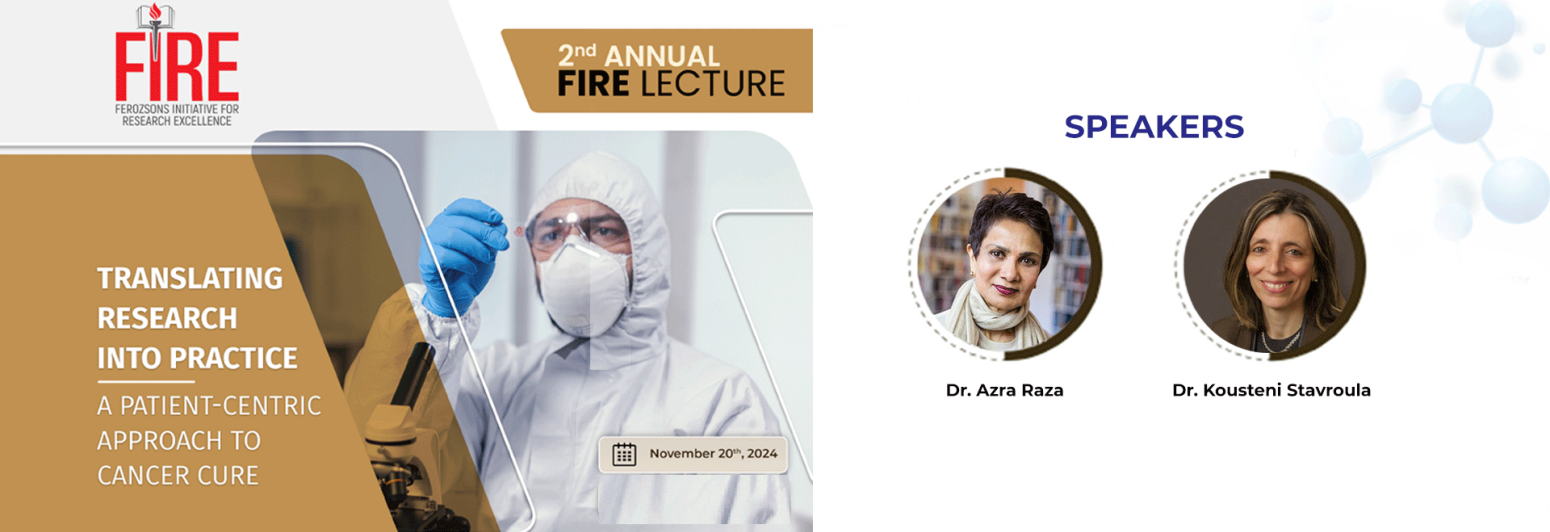
November 20, 2024
About Dr. Azra Raza
Professor Azra Raza is the Chan Soon-Shiong Professor of Medicine at Columbia University, a pioneering oncologist, and the Executive Director of The First Cell Coalition for Cancer Survivors. With over 30 years of groundbreaking research in Myelodysplastic Syndromes (MDS), she is also a renowned author and speaker, blending her expertise in science with a deep appreciation for literature. Her work focuses on early detection and prevention of cancer, making her a leading voice in the field of oncology.
About Dr. Kousteni
Stavroula Kousteni, PhD is Vice Chair of Physiology & Cellular Biophysics, the Edward P. Evans Chair in MDS research and Professor in Physiology & Cellular Biophysics and the Herbert Irving Comprehensive Cancer Center, Co-Director (with Dr. Azra Raza) of the Edward P. Evans Center for Myelodysplastic Syndromes at Columbia University, Director of Basic Science at the Herbert Irving Comprehensive Cancer Center, Director of Cancer Biology Graduate Studies Track and member of the Stem Cell Initiative at Columbia University. She joined Columbia University as an Assistant Professor in 2006. Prior to that she was an Assistant Professor of Medicine at the University of Arkansas for Medical Sciences, Little Rock (1999-2006). She received her Ph.D. degree from the University of Wales (1990-1994), followed by postdoctoral training at the School of Molecular and Medical Biosciences in Wales (1994-1997), UK, and the Hellenic Pasteur Institute in Athens, Greece (1997-1999).
The aim of Dr. Kousteni’s laboratory is to examine the role of the bone marrow microenvironment (or niche) in hematopoietic stem cell fate and function, in particular during the development of hematological myeloid malignancies. Her lab has shown that a specific mutation in osteoblasts enables in mice Myelodysplasia (MDS) rapidly progressing to and Acute Myeloid Leukemia (AML). This pathway can sustain MDS development and progression to AML in a subset of patients with MDS, since it is active in these patients’ osteoblasts. The finding that a stromal cell can directly induce MDS/AML is paradigm shifting and enhances the potential for drug therapy since the osteoblast in MDS or AML may be more amenable to drug therapy than the HSCs since it lacks the propensity to mutate and clonally expand. Her laboratory also showed that MDS/AML cells provide instructive signals altering the function of stroma cells to promote their growth in the marrow through secretion of SAA, the elusive inflammatory molecule, long-sought in hematology, promoting dysplastic/cancer cell growth.
Dr. Kousteni has followed up this work with projects aiming to identify HSC intrinsic and extrinsic mechanisms, the latter induced by mesenchymal stem cells, that promote transformation of MDS to AML, identifying subpopulations in the bone marrow microenvironment and mechanisms through which they interact with malignant cells to regulate disease progression. Her lab is delineating molecular pathways that induce or select for genetic alterations in pre-malignant hematopoietic stem cells that transform them to malignant ones and the specific stem cell functions that they are affecting. She applies cutting edge genetic tools, and single cell technology to integrate studies of clonal mutational evolution and niche components in patients and mouse models, to establish the mechanisms through which the aging marrow supports the outgrowth of AML initiating clones. The ultimate goal of her work is to identity therapies that target oncogenic signals stemming from the bone marrow microenvironment to prevent MDS and AML transformation and overcome targeted or standard of care therapy resistance.
Dr. Kousteni served in the Council of the American Society for Bone and Mineral Research (ASBMR), as the basic science Chair of the ASBMR 2020 Annual Meeting Program Committee, the Endocrine Society Annual Meeting Steering Committee; an ASBMR Task force to Expand Musculoskeletal Research, the ASBMR Program Committee, the Advisory board of the ASBMR Education Resource Center. In CUIMC she serves at the Scientific Research Advisory Committee to the Dean, Committee on Appointments and Promotions, the Faculty Council of the Faculty of Medicine, the Dean’s Executive Committee of the Faculty Council, and the Dean’s Advisory Committee for Women Faculty. She is the Director of a T32 in Endocrinology and Metabolism: “Hormones: Biochemistry and Molecular Biology”. She is at the editorial board of JBMR and Bone Research and served as an associate editor of JBMR Plus.



















